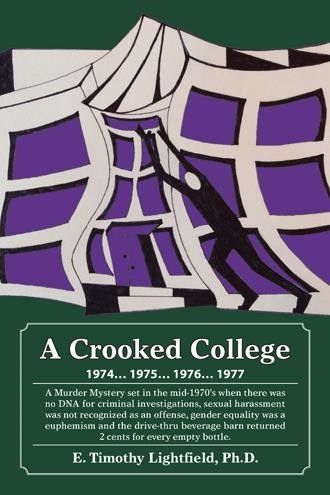Retired FCCJ vice president takes hard look at academia in 1970s with novel ‘A Crooked College’
On the surface, the convention of higher education is vaguely wrapped in Roman pillars and meticulously groomed landscaping. Students are seen weaving in and out of corners. They serve more as a decorative element to its inner workings, a faculty and administration pulling levers and oiling the academic machine — acting as the true face of the “Wizard of Oz.”
At least that’s the perspective of Ponte Vedra resident Dr. Timothy Lightfield, who is taking it upon himself to pull back the curtain of academic facade in his recently published book, “A Crooked College.”
In his first novel, Lightfield sets the stage for the corruption, chaos and confusion within a fictitious New Jersey college in the turbulent 1970s. All of this serves as the backdrop for the murder mystery that starts to unveil the administration’s secrets as the criminal investigation draws closer to revealing the true nature of the crime.
So, what is behind the curtain?
“Shenanigans,” Lightfield said.
A retired 30-year vet of higher education, Lightfield draws on his actual experiences and interactions as material for the novel. Serving over that period as a professor, researcher, chief academic officer, campus provost and president, Lightfield has extensive experience working within every aspect of the multi-faceted institutions. Part of his background includes serving as the vice president of academic affairs at the Downtown campus of Florida Community College at Jacksonville (FCCJ), which is now Florida State College at Jacksonville (FSCJ).
“It's more (about) relying upon your experiences to tell a story,” Lightfield said. “That's kind of what I did. I relied upon my experiences to the tell a fictional story in which the situations are nonfiction.”
Many of these situations reflect a time, said Lightfield, when sexual harassment wasn’t considered harassment and racism and gender inequality ran rampant within the administration.
“This was the beginning of women's equality,” Lightfield said. “Sexual harassment wasn't even a concept. What you do with that? It's not against policy because you don't have policy against it.”
Lightfield remembers a time when the college president was snapping the back of his co-worker’s bras for amusement. He also remembers arguments against observing Martin Luther King Jr. Day as a holiday and professors that were exchanging sexual favors for grades.
“Maybe there's a little bit of ‘Mad Men’ in it that it’s kind of an exposé of life in those days,” Lightfield said. “I mean, I remember they always had alcohol in the office. It was as common as having a glass of water. I remember (someone) that had a serious alcohol problem. How do you deal with it? There's no mechanism to deal it in that environment. How do you get him help? It was not recognized as a social problem. Let alone any sort of a disease that that needs treatment.”
The stark contrast between the formal storefront of higher education and the barbaric actions of the administration and staff is a running theme within the novel. The story progresses as the life of the deceased president is played out, simultaneously unraveling the secrets of the college. Sprinkled throughout the story are sketches of Irish folklore, illustrations drawn specifically for the novel by Lightfield’ s wife, Deborah, who is an artist and retired teacher as well.
Lightfield maintains that “A Crooked College” is not a literal exposé of FSCJ by any means. While the characters are based on actual people and many of the events were experienced, his work is ultimately fiction. Nonetheless, “there are people out there who did some of these things and should be sorry they did,” he said.








